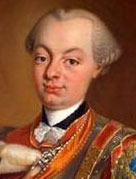| Profile | Major Works | Resources |
Charles Frederick, Margrave of Baden, 1732-1789.

German prince and Physiocrat.
Charles Frederick, Margrave of Baden (in German, Karl Friedrich Markgraf von Baden, in French Charles Frédéric, Marquis du Bade) was a German territorial prince, ruler of margraviate of Baden in the upper Rhine. Charles Frederick ascended as Margrave of Baden-Durlach as a child in 1738, reaching the age of majority in 1746. In 1771, he inherited neighboring Baden-Baden from his late relative Augustus George, thus uniting Baden under himself. He endeavoured to acquire territory to amalgamate the margraviate of Baden as a contiguous unit, integrate and overhaul the administration of his domains.
Charles Frederick's keen interest in promoting the prosperity of his little domain led him to economic writings. Charles Frederick had hosted the exiled Scottish mercantilist Sir James Steuart, who finished his 1767 Inquiry while in Baden. But the Margrave himself was drawn to the Physiocrats. He approached Mirabeau in correspondence in September 1769, and consulted them on a personal visit to Paris in 1771. Charles Frederick contributed to Physiocratic journals, notably a signed article in the opening volume of the re-launched Ephémérides in 1792, faithfully summarizing the principles of Physiocratic economics. It was written originally by Charles Frederick as a manual for his heirs, and was subsequently republished as a separate volume later that year under the supervision of Dupont de Nemours.
Carl Friedrich began introducing Physiocratic policy in his own principality - most famously, suppressing indirect taxes and introducing the single tax on land, implemented experimentally under the supervision of J.A. Schlettwein in the villages of Dietlingen, Theningen and Balingen in 1770. Although promising at first, it was not a success, and the experiment was abandoned in the latter two villages by 1776, although Dietlingen would be extended until 1792. He promoted the removal of restrictions on trade in the German Diet. In 1783, he abolished all remaining labor dues and promoted the establishment of large farms, which ran into political complications.
Charles Frederick brought the unemployed Dupont de Nemours to Karslruhe in 1772, endeavoring first to place him in charge of finances (the effort failed), then deciding to appoint him special councillor (in place of departed Schlettwein) and tutor to his heir. Dupont left Baden in 1774 to take up a position in Poland. After the fall of Turgot in 1776, Charles Frederick brought the Abbé Baudeau to Karlsruhe as privy councillor, again also briefly.
The correspondence between Charles Frederick of Baden and the Physiocrats was collected by Karl Knies in 1892.
Charles Frederick of Baden joined Austria's invasion of the fledgling French
Republic in 1792, but the little margraviate was eventually overrun by French
troops, and in 1796, Charles-Frederick was forced to cede all his domains on the
other side of the Rhine. In 1803, he made up for his by acquiring other
territories, notably the Bishopric of Constance, from the emperor. In 1805,
Charles Frederick flipped over to the French side, and acquired even more
territories. With the dissolution of the Holy Roman Empire 1806, he declared
himself sovereign prince and Grand Duke of Baden. He continued fighting for
Napoleon, and was rewarded with great swathes of territory at the expense of the
Kingdom of Württemberg. In all, Charles Frederick probably quadrupled the size
of his original inheritance.
Charles-Frederick died in 1811, succeeded by his grandson, the Grand Duke
Charles of Baden.
|
Major Works of Charles Frederick of Baden
|
|
HET
|
|
Resources on Charles Frederick of Baden
|
All rights reserved, Gonçalo L. Fonseca
